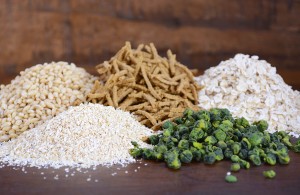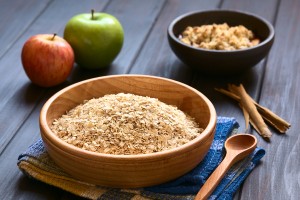Dietary fiber (also known as roughage) refers to the indigestible part of food derived from plants.
There are two types of dietary fiber: soluble fiber and insoluble fiber.
Soluble fiber, as the name suggests, dissolves in water. The fiber is readily fermented inside the colon into physiologically active byproducts and gases. Soluble fiber can be viscous and prebiotic.
On the other hand, insoluble fiber doesn’t dissolve in water.
The fiber is metabolically inert and offers bulking. It can also be prebiotic.
Insoluble fiber metabolically ferments in the large intestine.
The main task of fiber is easing defecation by absorbing water which helps the transit through the digestive system.
What are the benefits of getting enough dietary fiber on a daily basis?
According to the U.S. Food and Drug Administration (FDA), a person is supposed to eat 20-30 grams of dietary fiber every day. At this level, you can enjoy the full health benefits of eating fiber.
Then it is clear that eating fiber plays a crucial role in digestion. However, there are many other benefits you stand to enjoy by taking adequate amounts of dietary fiber on a daily basis.
These benefits include but are not limited to:
1. Lowering bad cholesterol levels: Soluble fiber found in oats, beans, oat bran and flaxseed has been tested and proven to lower bad cholesterol levels.
2. Reduced cancer risks: There are numerous research studies linking adequate dietary fiber consumption to lower cancer risks, especially colon cancer.
Such studies indicate that it prevents harmful food substances from affecting the colon. This, in turn, reduces colon cancer risks.
There are also studies indicating that eating adequate amounts of dietary fiber reduces risks of other cancers i.e. ovarian cancer, uterine cancer, and breast cancer. The research is, however, inconclusive.
3. Improved digestive health: Daily consumption of adequate amounts of fiber has also been proven to lower risks of developing hemorrhoids. This translates to improved digestive/gastrointestinal health.
4. Improved blood sugar levels: Soluble fiber is capable of slowing down the absorption of sugars. Thus improving blood sugar levels among people with diabetes.
5. Improved heart health: There are also studies indicating that consuming adequate amounts of fiber reduces heart disease risks.
6. Reduced kidney stone risks: Since dietary fiber helps to regular blood sugar, it can decrease the risks of insulin spikes. These spikes are associated with the formation of kidney stones and gallstones.
7. Improved skin health: Certain types of dietary fiber i.e. psyllium husk have been found to grab onto fungus and yeast when consumed adequately.
This prevents them from being excreted through the skin where they are known to cause skin rushes and breakouts.
8. Better weight management: Foods which are rich in insoluble fiber add bulk to the diet (minus the calories). This increases fullness and reduces cravings.
It allows better weight management. The main reason being that most people gain weight because of overeating after cravings and hunger set in.
Which foods should you integrate into your diet to boost your daily dietary fiber intake?
Dietary fiber is present in a variety of foods. Foods with the highest content are split peas, lentils, black and lima beans. Artichokes, peas, broccoli and Brussels sprouts are also excellent sources of fiber.
Fruits rich in dietary fiber include raspberries, blackberries, avocados, and pears. Whole grains rich in dietary fiber include whole wheat, flax seeds, oatmeal and pearled barley.
Are there any dietary supplements available?
Yes. Many supplements are available in the market today. However, the best way to get dietary fiber is naturally i.e. from whole foods.
Most health and nutrition experts recommend natural sources of dietary fiber. These are fresh vegetables, fruits, whole grains, beans, and nuts.
Examples of meals or healthy snacks that will help you increase your daily dietary fiber intake
There are many meals and healthy snacks you can prepare and consume to increase your fiber intake.
These meals and healthy snacks must obviously be prepared using some of the fiber-rich foods, fruits and whole grains mentioned above.
Below are some great meals and healthy snacks rich in dietary fiber.
1. Bran flakes: This snack contains 7 grams of fiber per cup (raw bran flakes).
To prepare bran flakes for breakfast or as a snack, you need to mix the bran flakes with honey and yogurt smoothie.
You can add some vanilla for flavor.
2. Carrot cake oatmeal: This is a great healthy snack for boosting your dietary fiber intake. You can prepare this healthy snack easily by mixing oats, carrots, and maple syrup together.
Carrot cake oatmeal can be eaten during breakfast and/or during the day when you are hungry.
3. Blackberry lemon salad: This is another great healthy snack rich in dietary fiber. This snack can be made by mixing blackberries, scallions, lemon and dill to taste.


2 Comments (Add Yours)